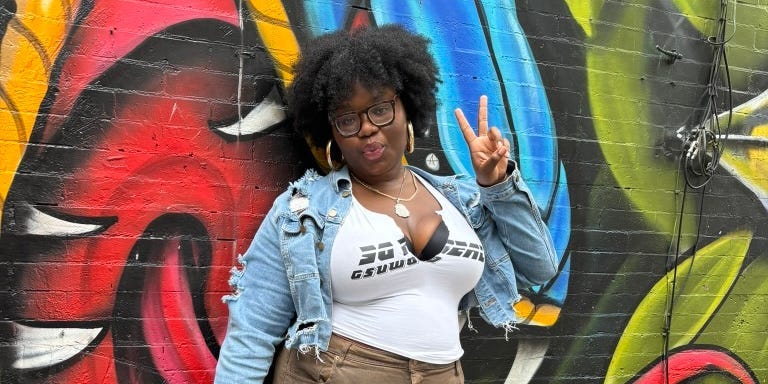I finally did it. I was the Black Carrie Bradshaw. Shortly after graduating from college with a degree in magazine journalism, I’d earned a position at one of the top fashion publications in the world.
Even though I was still living in my mom’s one-bedroom Bronx apartment, it felt like I was moving in the right direction to build my career in the industry.
My plan was to stay at home rent-free for a year while I saved for my own apartment, and I started off strong. I spent most of my time in the office, only stopping at home to change my outfit, add heels, and spray perfume before attending high-profile press events.
My mother (who is 67 and retired) and I were like passing ships, more like intergenerational roommates than family — until I was unexpectedly laid off.
I was immediately confronted with the reality that being home “temporarily” was going to look a lot more like “indefinitely.”
At first, I felt like a failure
Suddenly being home all the time was uncomfortable — I felt like an adult in a playpen. I didn’t know how to hold my own as a grown woman while living with my mother and relying on her financially.
I was trying to rediscover who I was and figure out my next move, while also navigating living in such tight quarters with another adult.
I’d already re-adjusted to my mother’s version of “tidy,” following her standards of cleaning and organizing on Saturday mornings, rather than sleeping in like I wanted.
But after the layoff, I had to adjust to other parts of her routine, too.
Ayana Herndon
To respect her sleep schedule as a retiree, I made an effort to be quieter in the mornings, and I created a more intentional routine to romanticize my living situation. I’d make a latte, recite my affirmations, and journal before taking on the day, snagging freelance writing gigs.
Converting one end of the dining table into a work desk with a laptop stand, comfy chair, and noise-canceling headphones, I learned to keep working even as she blended smoothies and watched “Tyler Perry’s Sistas.”
Of course, we were still subject to our fair share of petty arguments, debating everything from who misplaced the remote to who should use the living room. However, we were aware that our disagreements were fueled by our proximity, so we’d often leave the apartment at different times to give each other space.
Despite the challenges, having this unexpected extra time at home helped strengthen our bond
Ayana Herndon
Over time, gratitude for my situation took root. Long hours hunched over my laptop gradually turned into laughter-filled conversations with my mom about Gen Z slang (explaining “demure” was my favorite), how to use dating apps (which is how she met her long-term boyfriend), and stories from when she was my age.
On weekends, we’d make brunch together, sip mimosas, watch our favorite guilty-pleasure show, “Caught In The Act,” and of course, clean. Rather than driving me crazy like it did in the beginning, I found myself dancing with her, broom in hand, to her favorite songs from the ’70s. Those mornings became some of my favorite moments.
We grew closer than ever, sharing stories about our childhoods, our struggles, and our dreams for the future. My random breakdowns about feeling stuck were met with her stories of being laid off in her 20s, right after losing her mother, and then choosing to become a teacher.
For the first time, I saw my mom not just as a parent, but as a woman discovering life in her own way, just like me. And for that, I’m thankful.
Now, I’m ready for the next chapter, but I’ll always be grateful for this period of my life
After living with my mom for three years postgrad, I signed a lease for an apartment down the hall from her. I’m excited to start a new chapter — even if it’s only a few steps away — but I know I’ll miss those late-night talks, shared meals, and the precious close-knit time we spent together.
In society, moving back in with your parents can be seen as a step backward, a sign of failure, or a loss of independence.
But living through it, I’ve realized it can be a profound gift, offering the chance to stumble and fall while knowing you have a safety net woven from love, patience, and shared history.
Accepting help from those who love you doesn’t make you weaker — it makes you human. Sometimes, leaning into that support is exactly what helps you discover your strength.


